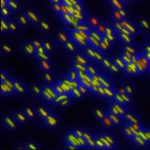Lien vers Pubmed [PMID] – 31583725
EMBO J. 2019 Oct;:e101876
Clonal microbial populations are inherently heterogeneous, and this diversification is often considered as an adaptation strategy. In clinical infections, phenotypic diversity is found to be associated with drug tolerance, which in turn could evolve into genetic resistance. Mycobacterium tuberculosis, which ranks among the top ten causes of mortality with high incidence of drug-resistant infections, exhibits considerable phenotypic diversity. In this study, we quantitatively analyze the cellular dynamics of DNA damage responses in mycobacteria using microfluidics and live-cell fluorescence imaging. We show that individual cells growing under optimal conditions experience sporadic DNA-damaging events manifested by RecA expression pulses. Single-cell responses to these events occur as transient pulses of fluorescence expression, which are dependent on the gene-network structure but are triggered by extrinsic signals. We demonstrate that preexisting subpopulations, with discrete levels of DNA damage response, are associated with differential susceptibility to fluoroquinolones. Our findings reveal that the extent of DNA integrity prior to drug exposure impacts the drug activity against mycobacteria, with conceivable therapeutic implications.

